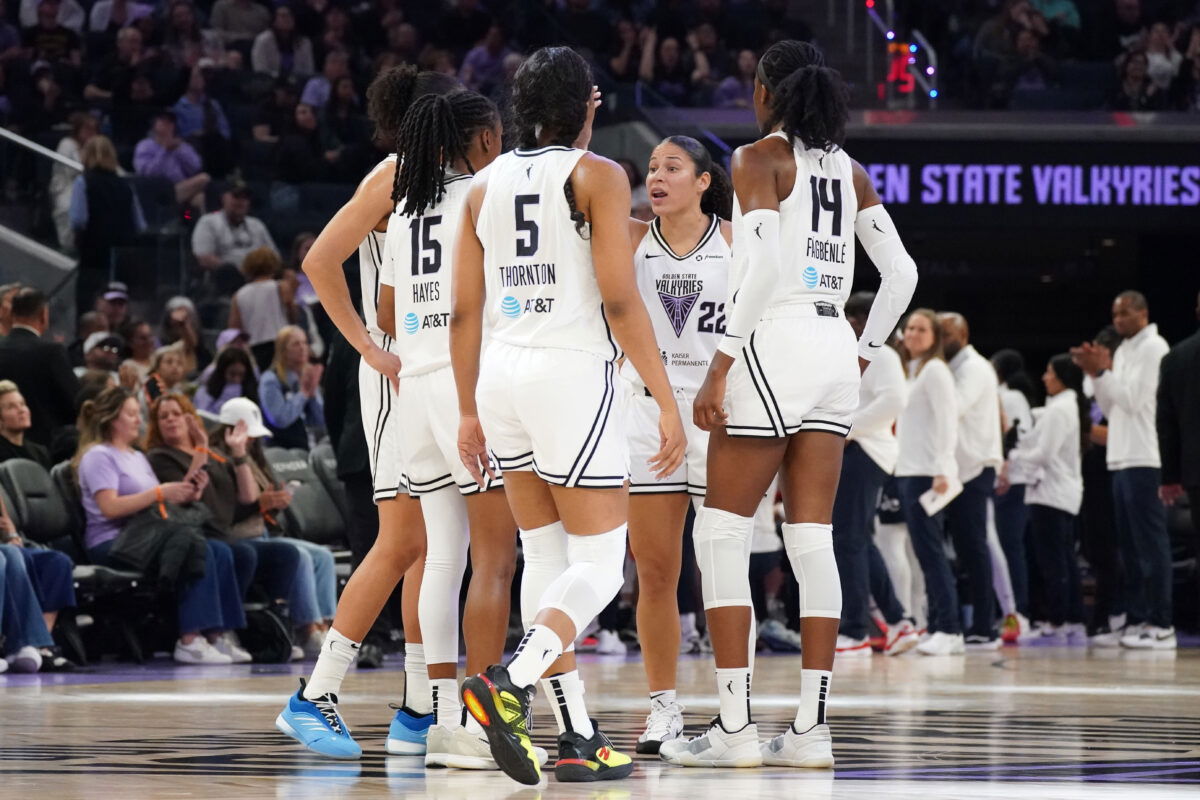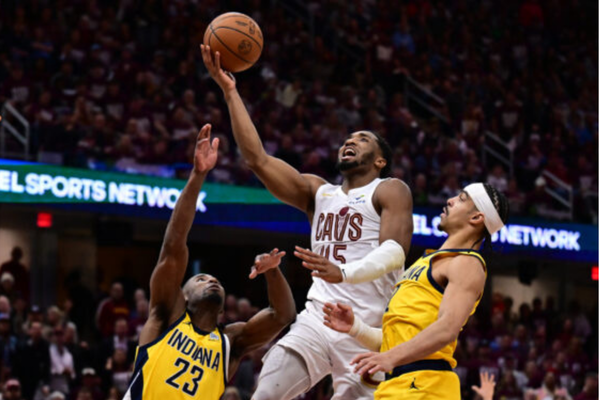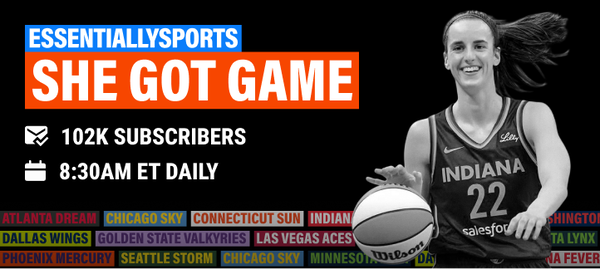
Imago
May 21, 2025; San Francisco, California, USA; Golden State Valkyries guard Tiffany Hayes (15), forward Kayla Thornton (5), guard Veronica Burton (22) and center Temi Fagbenle (14) huddle during a game against the Washington Mystics in the second quarter at Chase Center. Mandatory Credit: David Gonzales-Imagn Images

Imago
May 21, 2025; San Francisco, California, USA; Golden State Valkyries guard Tiffany Hayes (15), forward Kayla Thornton (5), guard Veronica Burton (22) and center Temi Fagbenle (14) huddle during a game against the Washington Mystics in the second quarter at Chase Center. Mandatory Credit: David Gonzales-Imagn Images
They’re just 9 games in, but the Golden State Valkyries aren’t playing like rookies—they’re rewriting the WNBA expansion playbook. Sitting at 4–5, they don’t scream lottery team—they scream legit. And the fans? They’re showing up loud. The Golden State just became the first WNBA team to average 18,000+ fans in their first three home games. On the court, they’re scrappy. Off the court, they’ve got Jackie Chan and Ali Wong courtside.
Watch What’s Trending Now!
In just a few weeks, the Valkyries have turned what was once seen as a trial run into a new gold standard.
ADVERTISEMENT
The bar has been set, and every city vying for the next WNBA team knows it.
“You need an arena and a practice facility and player housing and all the things, you need committed long-term ownership groups,” said commissioner Cathy Engelbert in 2024. “The nice thing is we’re getting a lot of calls.”
ADVERTISEMENT
Those calls came to a head in January, of 2025 when more than 10 prospective ownership groups submitted formal bids for team No. 16. An announcement is expected by fall, and while Cleveland is widely reported to have a 90% chance of being selected—with a record-setting $250 million bid from Dan Gilbert’s Rock Entertainment Group—the competition has turned fierce.
ADVERTISEMENT
If the Valkyries’ debut proved anything, it’s that being ready on paper isn’t enough—you need to deliver from day one. And right now, most contenders are trying to catch up.
Golden State had everything the WNBA wanted: NBA ownership ties (Joe Lacob, Warriors), a major media market, and the infrastructure (Chase Center) to support success. The team was officially announced on October 5, 2023, giving it a year and a half to prepare for its first regular season debut.
ADVERTISEMENT
That prep time included roster building, marketing, hiring, and facility readiness—each part executed like a franchise already in midseason form.
Now, cities like Cleveland, Nashville, and Houston are aiming to match that preparation.
ADVERTISEMENT
“Ownership commitment” and “city demographics” remain central to the WNBA’s evaluation process, and the Valkyries hit every mark. They also delivered something harder to measure: buzz. And that’s where teams like Kansas City, Denver, and Charlotte are trying to innovate.
Inside the Expansion Race: Who’s Next after the Valkyries?
Toronto Tempo: Set to make waves in 2026 as the first WNBA franchise outside the U.S., Toronto Tempo is breaking borders and making history. Backed by Kilmer Sports Ventures, who shelled out $115 million for the rights, this expansion isn’t just about geography—it’s about global ambition.
ADVERTISEMENT
Portland: Unveiled in September 2024, Portland’s to-be-named WNBA franchise is gearing up for a 2026 debut, with purpose and pedigree. Owned by siblings Alex Bhathal and Lisa Bhathal Merage, who dropped $125 million to bring the league back to Rip City, this team promises to blend Pacific Northwest passion with next-gen infrastructure.
Cleveland: Right now, all signs point to Cleveland as the clear front-runner. Dan Gilbert’s Rock Entertainment Group has thrown down a record-breaking $250 million bid—more than double what Toronto and Portland paid. They’ve got NBA ties, a home ready in Rocket Mortgage FieldHouse, and plans to revive the old Rockers name. Their trademark application even advanced on June 3, kicking off the 30-day opposition window. At this point, Cleveland feels like just one announcement away from officially becoming the WNBA’s next expansion team.

Imago
May 4, 2025; Cleveland, Ohio, USA; Cleveland Cavaliers guard Donovan Mitchell (45) drives to the basket between Indiana Pacers forward Aaron Nesmith (23) and guard Andrew Nembhard (2) during the second half in game one of the second round for the 2025 NBA Playoffs at Rocket Arena. Mandatory Credit: Ken Blaze-Imagn Images
Detroit: Power players. Championship pedigree. And Slim Shady in the ownership mix? Detroit’s bid to bring back the three-time WNBA champion Detroit Shock is nothing short of star-studded. Backed by Pistons owner Tom Gores, NBA legends Grant Hill and Chris Webber, Lions QB Jared Goff, GM CEO Mary Barra, and yes, Eminem—who reportedly dropped a $150–200 million bid in March—this is more than nostalgia. It’s a revival in the making. As Adam Silver put it, “It’s really just a question of when the Shock comes back.”
ADVERTISEMENT
Nashville: A bid built on legacy—and legends. Bill Haslam, owner of the NHL’s Predators and former Tennessee governor, is leading the charge alongside his wife, Crissy, with WNBA icon Candace Parker, NFL great Peyton Manning, and country star Faith Hill all in the huddle. Their proposed team name? Tennessee Summit—a tribute to the late, great Pat Summitt. With a city rich in culture and sports tradition, and Cathy Engelbert already “very impressed,” Nashville is aiming for a 2028 debut—and they’re playing for keeps.
The group said it planned to submit a bid Thursday afternoon in hopes of bringing a franchise to Nashville for the 2028 season.
ADVERTISEMENT
Kansas City: Big stars, big plans, and even bigger belief. Backed by Chiefs quarterback Patrick Mahomes and the ownership group behind the NWSL’s Kansas City Current, this bid is banking on hometown pride and serious infrastructure. With a 60,000-square-foot private practice facility in the works and a downtown arena deal already on the table, KC is ready to hoop. “It would be packed every single night,” Mahomes promises—and if history’s any guide, he’s probably right.
Philadelphia: Snubbed but not sidelined. Backed by Harris Blitzer Sports & Entertainment (owners of the 76ers), Comcast, and Philly’s mayor, this bid is still in play—loud, proud, and infrastructure-ready. Philly was on the 2025 shortlist, but the nod went to the Valkyries and Portland instead. Now, with Toronto’s Tempo locked in and Detroit courting stars like Eminem, Philly’s staying in the race with a vision: a new stadium, big-league backing, and a hunger to prove the City of Sisterly Love belongs in the W.
Houston: The birthplace of a dynasty wants back in. Rockets owner Tilman Fertitta has officially submitted a bid to bring the WNBA back to H-Town, with the Toyota Center set as the franchise’s home. And let’s be real—no team carries more legacy weight than the Houston Comets, the league’s first true juggernaut and the only four-peat champions in WNBA history (1997–2000).
Austin: Led by former Bucks co-owner Marc Lasry and featuring NBA star Kevin Durant and ex-Comets player Fran Harris. The bid includes a practice facility and usage of the Moody Center. The basketball pedigree is real—but Austin isn’t an NBA market.
Charlotte: Tied to Hornets ownership, the bid promises a revival of the Charlotte Sting legacy. The fan base is deep, and the NBA alignment checks a key league box.
Denver: The Dimond family’s bid includes a purpose-built arena and a community-rooted approach. Ashley Dimond would serve as governor, offering female-led ownership, a growing priority in women’s sports.
But the WNBA is moving fast. On February 3, 2025, the league filed trademarks for five legacy names—Charlotte Sting, Detroit Shock, Houston Comets, Miami Sol, and Cleveland Rockers—signaling just how seriously these markets are being considered.
The question now? Who’s next—and will Cathy Engelbert stick to the plan of stopping at 16 teams by 2028? The clock’s ticking, and the final roster of cities is still very much in play.
ADVERTISEMENT
ADVERTISEMENT
ADVERTISEMENT
